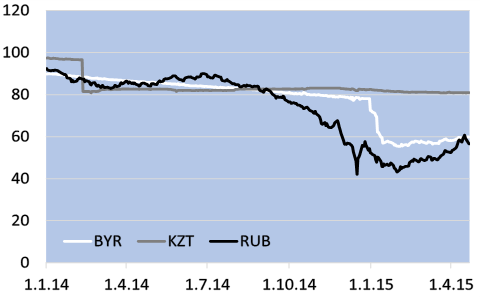BOFIT Weekly Review 17/2015
Import disputes in the Eurasian Economic Union
Kazakhstan announced last week that it would pull certain Russian food items off the shelves as they failed to comply with Kazakhstan’s food safety regulations. Soon thereafter, Russia’s Federal Service for Veterinary and Phytosanitary Surveillance responded by similar measures for some Kazakhstan dairy products. Several Belarusian meat producers have faced import bans from Russia since late last year for similar reasons and Belarus imposed corresponding restrictions to some Russian foodstuffs. In addition, Russia has inspected food shipments entering the country from Belarus to prevent abuse of EEU privileges to circumvent Russian bans on European food products.
In early March, Kazakhstan imposed a 45-day import ban on Russian petroleum products. As Kazakh imports are subject to an annual import quota of duty-free petroleum products from Russia, Kazakhstan officials said the ban was needed to rebalance fluctuations in demand. They noted that, without the break, the rapid growth in imports would have caused the entire year’s quota to be filled too early. For January-February, the volume of exports of Russian oil products to Kazakhstan increased nearly 70 % y-o-y.
The ruble’s collapse late last year increased other EEU members’ imports from Russia. This raised discussion in Kazakhstan on whether to impose a temporary ban on imports of certain Russian products. Belarus president Alexander Lukashenko has also been unsatisfied on the effects of the ruble’s collapse and demanded e.g. increasing the role of US dollars and euro in trade with Russia. Additional dissatisfaction in Belarus has arisen from changes in Russian oil taxation at the start of this year that have reduced the benefits of bilateral oil trade for Belarus.
While cooperation among EEU members is not always smooth, president Putin envisions nevertheless deeper cooperation. At the EEU meeting last month, Putin suggested it was timely to start exploring the possibility of adopting a common EEU currency. The EEU should also expand in May with Kyrgyzstan’s accession.
Dollar rates for Russian ruble, Belarus ruble and Kazakhstan tenge, (100 = 1 Jan. 2013)

Source: Macrobond